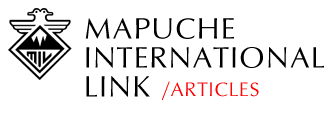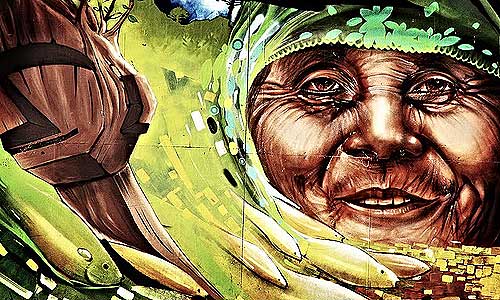
 |
|
|
| Home
| Front Page
| News
| Documents | Environmental
| Archive
| Links
| About Us |
|
Monday, May 30, 2011 Cowboys, Indians And Pseudo-Superheroes Natalia Sanchez-Bell - On the ongoing plight of Chile's Mapuche people
There is a war going on in Chile, a war that has been raging for over 500 years. It seems like such a normal part of life now that the world doesn’t even notice it anymore. Like many other conflicts, it concerns territory and resources. Those waging it are depicting themselves as the ‘General Custers’ of this story, bravely facing the threat of being scalped, carving out a niche for the more civilised and deserving. Those standing in the way of ‘progress’ are deemed savages, terrorists even. But is it terrorism to resist this second pacification of Araucania? One of the darlings of the official narrative is Michelle Bachelet, head executive of UN women and ex-president of Chile. Bachelet has been hailed in the mainstream media as a new superhero for women’s rights around the world; painted as someone with great compassion who has suffered for her convictions, a paragon of integrity. Ms Bachelet does have a secret identity, but any analogy with superheroes must end there. During her administration members of the Mapuche tribe - Chile’s first peoples – were imprisoned and tried using anti-terrorist legislation enacted during the Pinochet dictatorship. Since a return to democracy, successive governments have made amendments that widen the scope of acts that can be defined as terrorism. They have routinely used it to silence opposition to the misappropriation and misuse of indigenous land. Bachelet, however, explicitly promised not to do so during her election campaign. It would appear, though, that people power was not intended for the Mapuche. With the advent of Wikileaks came the revelation that she had also enlisted the help of the CIA in a further attempt to discredit their civil resistance as terrorism. Bachelet’s own father was assassinated and she and her mother were tortured for opposing the military coup that this agency backed in 1973. Not surprisingly, the CIA found no real connections between the Mapuche and ETA, FARC or any of the other extremist organisations, saying they were ‘overwhelmingly non-violent’. They also called into question the Chilean media’s misrepresentation of the situation. They observed that one ‘might think that violent Mapuche activists, related to the FARC and ETA, kill innocent civilians every week,” when watching the news. The truth is that the only deaths related to this struggle have been within the indigenous community itself, at the hands of the bigoted authorities. In 2008, Matias Catrileo Quezada, a young Mapuche student involved in a peaceful protest, was shot in the back whilst retreating as the police opened fire into the crowd. Brutality when dealing with the Mapuche has become the norm rather than the exception, including in regards to minors. The policeman who shot him received only a two year suspended sentence. It is hard, as could be imagined, to prove allegations against a police force that acts with such impunity, all sanctioned by the state. Sadly the Mapuche are not strangers to the hypocrisy of the Chilean establishment. For generations they have endured violence, false hope and broken promises. Their culture is being systematically erased. Ms Bachelet recently attended the European Parliament to discuss strengthening ties between the EU and UN Women. Juana Calfunao, a Lonko or political chief, finally released and given permission to travel after being imprisoned for some 6 years and a half years for ‘public disorder’ had also been invited and remarked: “Very nice speech, if that mentality existed when you were in government, I would not be suffering what I live with my family today. We were condemned by government policy and spent 4 years of her term in prison, my youngest daughter exiled and my family destroyed, anti-terrorism law applied to members of my people, who are now imprisoned with a sentence of 20 to 25 years in prison.” The 25 year sentence refers to the ‘CAM four’, members of the Coordinadora Arauco Malleco, a group which uses land occupation and equipment sabotage and arson to fight the selling off of their lands to big business. When a choice between assimilation and eradication is the only option proffered, it is unsurprising that such radical groups are emerging. They are currently on their 77th day of a hunger strike. Two of the four have so far been hospitalised. The administration has since changed and Chile and the Mapuche now have a new hypocritical operator at the helm, Mr Sebastián Piñera. This is a man who made his billion during the dictatorship selling credit cards, voted no in the 1988 plebiscite against Augusto Pinochet, whilst simultaneously managing the election campaign for Hernan Buchi, finance minister for the regime for 10 years. In other words, a total opportunist. All this plus comparisons of the president with Italy’s Silvio Berlusconi before and after his election do not bode well. Once again, someone with vested interests in big business, the main competitors for Mapuche territory, is in charge. The world’s press lauded him for his ‘heroic’ efforts to save the 33 miners who were trapped in the San Jose mines last autumn whilst ignoring the 34 Mapuche who had been on hunger strike prior, during and after this accident. Indeed the Chilean media censored a note sent up by these miners expressing support for the Mapuche cause. He has not only continued to use the anti-terrorist legislation against the Mapuche, but also begun to victimise the Rapa Nui of Easter Island. Empty rhetoric surrounds the implementation of the 169 ILO convention for tribal and indigenous people’s rights. Major issues still exist around consultation and projects on land that should be considered Mapuche territory are being pushed through all the time. The HidroAysén project, a hydroelectric dam to be built in Patagonia, is a further evidence of this. The general population are against its construction with ongoing large-scale protests. The indigenous population may have to contend with high-voltage power lines that will be part of that project running through their territory. The electricity generated goes not to their communities but rather to power the mining industry in the north of Chile. They have petitioned the Supreme Court to stop this. The CONADI (the Chilean government’s indigenous corporation), still not sufficiently autonomous, is incredibly slow in giving land back to the Mapuche. Responding to pressure from human right’s groups and the UN, reforms to the Anti terrorism law were agreed. In practice, however, they seem largely ineffective. One protocol was that minors would now be exclusively referred to youth courts. This has already been breached. The Inter-American Commission on Human Rights (IACHR) pointed out that the changes were ‘problematic because the anti-terrorism laws provide harsher penalties and permit longer periods of preventative detention of arrested individuals, and the lack of clear definition for terrorism increases the likelihood of human rights abuses.’ In the face of these seemingly insurmountable obstacles, it is easy to become cynical and lose hope. Sanctions from the international community for human rights violations seem unlikely to take place anytime soon; it appears Chile is too lucrative a partner to upset. Survival International suggests boycotting certain companies, protesting, signing petitions, staying informed and spreading information. Searching for answers, I look to the Mapuche themselves. They have been fighting for half a millennium, and if the CAM four are anything to go by, there is no sign of them letting up. The Mapuche have a war cry, ‘Marichiweu’, it means ’10 times we will win’. After this long struggle, they certainly deserve to.
|
| |
||
|
||
